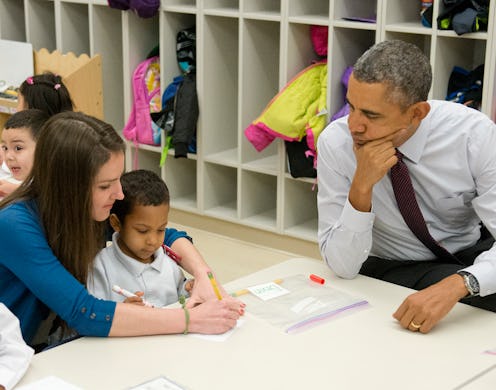News
How & Why We Should Appreciate Teachers More
Despite having what’s arguably one of the most important and difficult jobs in the country, American teachers get almost no respect. In honor of Tuesday's Teacher Appreciation Day and Teacher Appreciation Week, we’d like to propose a few remedies. There are numerous ways America’s education system could better give teachers the respect they deserve while also giving the kids the education they need. Here are three ways we could better appreciate our teachers.
Pay Them More
You knew this one was coming. The average American public school teacher makes a little over $56,000 a year, and the average starting salary is just $39,000. That’s less than a living wage in a lot of cities, and as a result, the number of teachers who work a second job to make ends meet is steadily ticking upward. This relatively low pay has a number of consequences.
For one, it discourages high-achieving people who want to do good from pursuing teaching careers. This brings down the average quality of teaching; when high school teachers only make 72 percent of the average income of college graduates, there’s a strong incentive to forego teaching and pursue a more lucrative path instead.
Equally importantly, paying teachers so little denigrates their standing with the general public. According to the Global Teach Status Index, American teachers command significantly less respect than their counterparts in many other countries, including China, South Korea, Singapore, Greece and Turkey. The U.S. is only one of three countries with a populace that supports lowering, rather than increasing, teachers’ pay.
Singapore, which posts the second-highest math scores in the world, spends a whole 20 percent of its budget on education. While it’s perhaps unrealistic to expect American education funding to ever hit that level, the U.S. could certainly do better than the just two percent of federal funding that currently goes to schools.
When teachers aren’t viewed as a respectable component of society, the perceived value of education itself is also diminished. That discourages both students from taking school seriously and prospective teachers from entering the field.
Treat Them Like Professionals
Being a public school teacher in the U.S. requires a bachelor’s degree and, depending on the state, some small manner of additional certification. While that’s not for nothing, many of the countries that outperform the U.S. in quality of education require prospective teachers to undergo between three and four years of additional professional training before they start teaching. They spend this time learning how to teach the subject in question, studying the specific obstacles that come along with teaching that subject, and undergoing at least one year of training in an actual school.
In other words, educators are treated and trained as highly-trained professionals in a unique field who have an immense social responsibility and value. And unsurprisingly, children taught by these teachers generally outperform their American counterparts. Finland implemented this type of teacher’s training in 1979; forty years later, Finnish students are consistently some of the most well-educated in the world.
In short, requiring teachers to undergo more training and education results in both better teachers and more respect for the institution of teaching. It’s about time the U.S. raises the bar.
Make The School Day Shorter
First of all, shorter school days mean less cranky kids, which means less animosity directed towards teachers, and a more hospitable teaching environment for everybody. The bigger reason that the school day should be shortened, however, is to give teachers more time to prepare for class.
That’s how it works in Finland, where teachers and students only spend around 60 percent as much time in classrooms as in America (600 hours a year versus 1,080 hours a year, respectively). In the time they save, teachers focus on developing lesson plans that are custom-tailored to each individual class, which increases the efficiency of the time they do spend teaching.
Now, some have argued that school days should actually be longer. As proof, they’ll point to Japan, where students go to school for seven hours a day, five and a half days a week, with less vacation time — and score better on standardized tests than most Americans. However, Japanese students also have much more recess time than American students: The average Japanese teacher only spends four hours a day in an actual classroom, compared to the six and a half hours most American schoolteachers spend.
The point here is that spending less time in the classroom appears to be beneficial for both students and teachers. By giving teachers a few hours away from instruction every day, schools encourage them to be more intentional and meticulous in crafting the material that they actually end up teaching. And most students, it goes without saying, would love to spend less time in class every day.
So, yes, Happy Teacher Appreciation Week. But remember: Even if you can't change education policy, you can choose to respect our educators, every week.
